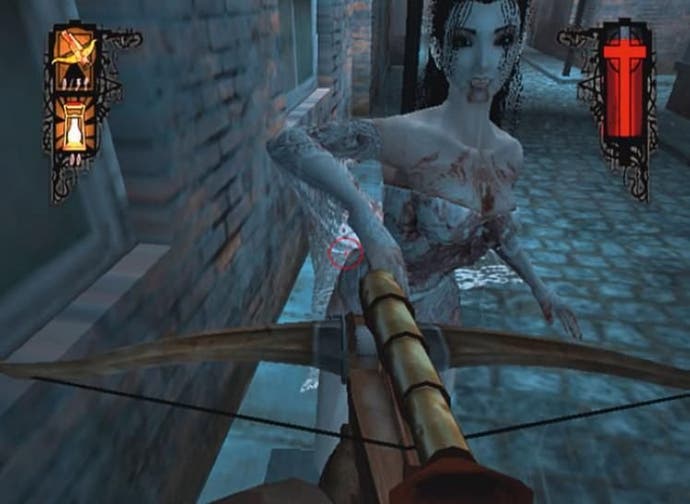Retrospective: Daemon Summoner
Sometimes the dead should stay dead.
When you lose in Daemon Summoner, you don't go back to your last checkpoint, the beginning of the level, nor even the load screen. You find yourself unceremoniously dumped at the "Press Start" screen! Then after agonisingly accessing the memory card, choosing the save position to load, waiting for it to say it's finished loading, then for it to actually load, then the unskippable cutscene at the start of level 2, and you're off!
In this level you must sneak aboard a boat on which the vamps are scarpering. To do this you are told you must get across via a crane from a nearby warehouse, packed with the undead. If you're seen, game over. And you are. Whether you're visible or not.
I have watched that opening cutscene so many times I know it off by heart, right down to the insane grimace offered by head vamp, Cheesy McBitington. I then sneak into the warehouse, and through trial and error know to hide in one area as some of the guards suddenly sprint for the entrance for no reason. Then it's to the steps, and the walkways, where you must reach the crane which is in no way possible.
That's as far as I've gotten. I've essentially written you a walkthrough for the areas of the game I can reach. It isn't possible to get across that walkway, because the vampires patrol it in such a way that there's never a clear gap. Oh, and can see you when they're not looking. Which cuts to a little death scene taking place somewhere other than the walkways, where one vampire waggles his leg about a foot behind your head, you fall down, and then watch the unskippable to cutscene of the boat pulling away, sailing off to sea, and the camera slowly drifting down behind some crates, before we're back at the main menu.
It's too much. Far too much. How did it happen? I got in touch with that developer and asked, "Why?"
"We were told to," he replied. Before adding, "Well, ok, slightly more substantial answer: This is somewhat the destiny of being a small independent studio that has to pay wages and for office space that hasn't got the resources behind it to develop their own IPs. It seems like a vicious circle of trying to make money from outsourced projects to pay for staff to make outsourced projects, and if you're not careful it can lead to a dark place."
It seems that Daemon Summoner was made in around three months. Which is... extraordinary. The FPS engine was in place, but they put together an entire game, no matter how dreadful, in just a few weeks.

"Timescales get shorter, budgets get tighter, teams get smaller," my mole tells me, who is in fact Chris Simpson, now of Indie Stone fame. "Until you get to the crazy situation where one sole programmer is responsible for development of an entire game in just a few months."
The situation was not fun, and it's defined the philosophy for his current independent team. "Obviously this was the worst case situation and going into our own indie endeavours it's what's prompted us to have the policy we'll never hire staff, never have office space. Because as soon as you have those financial commitments you end up losing ground with each project, and when you have staff to pay and haven't got the money to do it, then you end up getting outsource work to pay the bills, and it just descends from there and is very difficult to recover."
It's interesting to see a bad game in this light. It doesn't make it any less of a bad game, and as soon as money is charged for a product, it's always fair game. And Simpson agrees entirely. But a few years later, it's interesting to allow a more human angle on it all. Simpson explains that blame for such things is easy to throw around. "While working on it it's easy to feel like its your bosses fault, or the designers fault, or your own fault, but really it's just about a company trying to make its way with limited resources."
Does that make mocking a shitty game unfair? I certainly don't think so. Simpson is perhaps more balanced. "It's easy to judge a game on how it turns out, but it's never the full story." I'd argue it is for the player, of course. "Everybody enjoys reading bad reviews. I've enjoyed bad reviews of games I've worked on, mostly when I knew from day one what I was working on was shit and never had a chance of being anything, but you stop feeling shame after a while, because you're sure it's not you that's personally responsible."
Which seems to be a dangerous path to head down. But Simpson suggests it can eventually be the inspiration you need. "It is that that drives you to eventually set off doing your own thing, not only to try and finally make a success of yourself, but to prove that all that time you were right, and it wasn't you, it was the situation, or everyone else on the project, or your bosses, or whatever else."
If it took Daemon Summoner to get us the potential of Project Zomboid, was it worth it? Certainly not if you bought the thing, I'd ponder.








